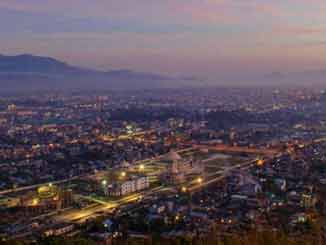

Sapan News When armed attackers burnt down the official residence of Manipur state’s only woman minister in the state capital, Imphal, it added another layer to an already violent ongoing conflict between tribal communities in Northeast India.

The conflict began over a month ago, largely between the Meitei and Kuki-Zo communities. Nemcha Kipgen, a Kuki, is the state’s industry minister. She was not home on Wednesday when the attack took place.
“If a Kuki minister is unsafe in the state’s capital, how can anyone expect Kukis not to demand a separate state?” tweeted Ashok Swain, Professor of Peace and Conflict Research at Uppsala University, Sweden.
Between May 3 and June 14, the violence claimed 115 lives and displaced over 50,000, many of them forced into camps.
Members of the Kuki community, including parliamentarians from the ruling BJP, are calling for separation from Manipur and the immediate imposition of the President’s rule. Diaspora groups watching the situation with concern include the Boston South Asian Coalition (BSAC), which has condemned the violence and called for the state and the central governments “to resume tripartite talks with insurgent groups and involve community elders, including women”.
An intergenerational Southasian-led organising collective formed in 2017 on Pawtucket/Wampanoag land in the Boston area, the group works on justice and rights issues. Members include students, professionals and activists from the diaspora and the region, including Manipur.
In a collectively drafted statement published on 14 June 2023, BSAC notes that the “indefinite internet ban, rendered more volatile by insurgent groups of all hues and hate speech rhetoric on social media.”“In these tough times, we stand in solidarity with the victims and survivors of violence from all communities and call upon all parties to engage in dialogue.” says the statement, highlighting “the rare but hopeful stories emerging from the region – Kuki women forming a human chain to protect Meitei people in Churachandpur from mobs and the care shown by Meitei folks to their Kuki friends in the Imphal valley.”
The statement outlines the timeline of the current violence, catalysed by a High Court of Manipur order in April to submit a recommendation to include the Meiteis in the Scheduled Tribes (ST) list. A tribal solidarity rally in protest against the order was followed by rumours that Meiteis were trying to burn a Kuki War memorial and that a mob was setting fire to Meitei settlements, notes BSAC, adding that “there are longer socio-historical forces at play that must be reckoned with, one of which is the hill-valley divide.”
This crisis was also “precipitated by the N. Biren Singh-led BJP state government’s ‘war on drugs’ and the recent spate of evictions of Kukis amid charges that they were encroaching on forest areas in hill districts Kukis have traditionally called home. The establishment also accused the Kukis as solely responsible for increasing poppy cultivation in the hill districts, increasing ethnic tensions,” says the statement.
Commenting on the “clear crisis of political faith” in the state government, BSAC terms this a loss for “all communities and Manipur at large”.
The Boston South Asia Coalition has condemned “the rhetoric of the BJP-led government in Manipur framing Kuki-Zo tribes as ‘illegal’ and ‘drug lords’ as the Chin refugees (the Kuki’s ethnic kin) fled the conflict in Myanmar.”
“We locate these clashes in the colonial expansion over two centuries ago and the changing political economy of the region. There are increasing clashes over forest rights, boundaries and pressure on indigenous land practices and livelihoods. There has also been continued identity manipulation, including through Brahminical imaginings and an attempt at re-imagining and re-writing history,” says the statement.
The Coalition notes “the absence of a clear humane refugee policy in the context of the refugee crisis in Myanmar, the brunt of which will be borne by some communities and regions more than others.”
“Meanwhile, the government continues to open forests up to corporations and elites, including through the recently introduced Forest Conservation (Amendment) Bill 2023 that seeks to convert forest land into non-forestry use and implement national security projects along 100 km of international borders, affecting most of Northeast India.”
“It is regrettable that some parties (both in mainland India and revivalists in the region) are trying to frame this ethnic clash as a religious one, claiming that Christian tribals are attacking the Hindu Meiteis,” says the statement.
“The armed forces have had to be called in to mitigate the situation in a context where Armed Forces (Special Powers) Act (AFSPA) is still normalized – a huge setback for communities that have spent decades protesting it.” Bringing in the army “can only be a temporary measure,” says the statement, demanding “the repeal of AFSPA from Manipur and other conflict areas”.
The lack of faith in the peace committee formed by the union government is understandable, given that it was done “without due consultation,” notes BSAC.
“We stand by the indigenous women from the region who call for the establishment of a Northeast India Truth and Reconciliation Commission led by indigenous women to work towards reconciliation,” says BSAC.
“We also urge both mainland and Manipur-based media houses to refrain from fanning the flames and to take utmost care in how they report.
“We hope for peace, reconciliation and collective healing of all affected,” concludes the statement.
Congress Partly leader Rahul Gandhi has also urged the government to “shut this ‘Nafrat ka Bazaar’ (market of hatred) and open a ‘Mohabbat ki Dukaan’ (shop of love) in every heart in Manipur.”

Leave a Reply